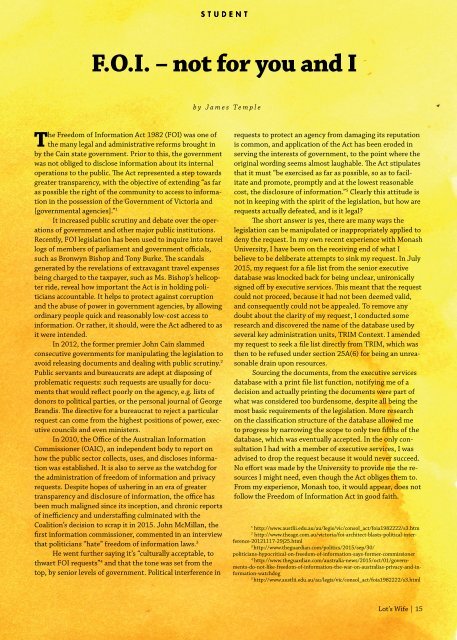Lot's Wife Edition 2 2016
You also want an ePaper? Increase the reach of your titles
YUMPU automatically turns print PDFs into web optimized ePapers that Google loves.
STUDENT<br />
F.O.I. – not for you and I<br />
by James Temple<br />
The Freedom of Information Act 1982 (FOI) was one of<br />
the many legal and administrative reforms brought in<br />
by the Cain state government. Prior to this, the government<br />
was not obliged to disclose information about its internal<br />
operations to the public. The Act represented a step towards<br />
greater transparency, with the objective of extending “as far<br />
as possible the right of the community to access to information<br />
in the possession of the Government of Victoria and<br />
[governmental agencies].” 1<br />
It increased public scrutiny and debate over the operations<br />
of government and other major public institutions.<br />
Recently, FOI legislation has been used to inquire into travel<br />
logs of members of parliament and government officials,<br />
such as Bronwyn Bishop and Tony Burke. The scandals<br />
generated by the revelations of extravagant travel expenses<br />
being charged to the taxpayer, such as Ms. Bishop’s helicopter<br />
ride, reveal how important the Act is in holding politicians<br />
accountable. It helps to protect against corruption<br />
and the abuse of power in government agencies, by allowing<br />
ordinary people quick and reasonably low-cost access to<br />
information. Or rather, it should, were the Act adhered to as<br />
it were intended.<br />
In 2012, the former premier John Cain slammed<br />
consecutive governments for manipulating the legislation to<br />
avoid releasing documents and dealing with public scrutiny. 2<br />
Public servants and bureaucrats are adept at disposing of<br />
problematic requests: such requests are usually for documents<br />
that would reflect poorly on the agency, e.g. lists of<br />
donors to political parties, or the personal journal of George<br />
Brandis. The directive for a bureaucrat to reject a particular<br />
request can come from the highest positions of power, executive<br />
councils and even ministers.<br />
In 2010, the Office of the Australian Information<br />
Commissioner (OAIC), an independent body to report on<br />
how the public sector collects, uses, and discloses information<br />
was established. It is also to serve as the watchdog for<br />
the administration of freedom of information and privacy<br />
requests. Despite hopes of ushering in an era of greater<br />
transparency and disclosure of information, the office has<br />
been much maligned since its inception, and chronic reports<br />
of inefficiency and understaffing culminated with the<br />
Coalition’s decision to scrap it in 2015. John McMillan, the<br />
first information commissioner, commented in an interview<br />
that politicians “hate” freedom of information laws. 3<br />
He went further saying it’s “culturally acceptable, to<br />
thwart FOI requests” 4 and that the tone was set from the<br />
top, by senior levels of government. Political interference in<br />
requests to protect an agency from damaging its reputation<br />
is common, and application of the Act has been eroded in<br />
serving the interests of government, to the point where the<br />
original wording seems almost laughable. The Act stipulates<br />
that it must “be exercised as far as possible, so as to facilitate<br />
and promote, promptly and at the lowest reasonable<br />
cost, the disclosure of information.” 5 Clearly this attitude is<br />
not in keeping with the spirit of the legislation, but how are<br />
requests actually defeated, and is it legal?<br />
The short answer is yes, there are many ways the<br />
legislation can be manipulated or inappropriately applied to<br />
deny the request. In my own recent experience with Monash<br />
University, I have been on the receiving end of what I<br />
believe to be deliberate attempts to sink my request. In July<br />
2015, my request for a file list from the senior executive<br />
database was knocked back for being unclear, unironically<br />
signed off by executive services. This meant that the request<br />
could not proceed, because it had not been deemed valid,<br />
and consequently could not be appealed. To remove any<br />
doubt about the clarity of my request, I conducted some<br />
research and discovered the name of the database used by<br />
several key administration units, TRIM Context. I amended<br />
my request to seek a file list directly from TRIM, which was<br />
then to be refused under section 25A(6) for being an unreasonable<br />
drain upon resources.<br />
Sourcing the documents, from the executive services<br />
database with a print file list function, notifying me of a<br />
decision and actually printing the documents were part of<br />
what was considered too burdensome, despite all being the<br />
most basic requirements of the legislation. More research<br />
on the classification structure of the database allowed me<br />
to progress by narrowing the scope to only two fifths of the<br />
database, which was eventually accepted. In the only consultation<br />
I had with a member of executive services, I was<br />
advised to drop the request because it would never succeed.<br />
No effort was made by the University to provide me the resources<br />
I might need, even though the Act obliges them to.<br />
From my experience, Monash too, it would appear, does not<br />
follow the Freedom of Information Act in good faith.<br />
1<br />
http://www.austlii.edu.au/au/legis/vic/consol_act/foia1982222/s3.htm<br />
2<br />
http://www.theage.com.au/victoria/foi-architect-blasts-political-interference-20121117-29j25.html<br />
3<br />
http://www.theguardian.com/politics/2015/sep/30/<br />
politicians-hypocritical-on-freedom-of-information-says-former-commissioner<br />
4<br />
http://www.theguardian.com/australia-news/2015/oct/01/governments-do-not-like-freedom-of-information-the-war-on-australias-privacy-and-information-watchdog<br />
5<br />
http://www.austlii.edu.au/au/legis/vic/consol_act/foia1982222/s3.html<br />
Lot’s <strong>Wife</strong> | 15

















